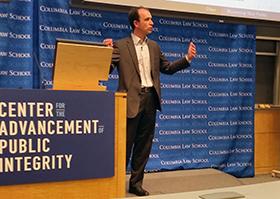The Economics of Corruption
New York, September 19, 2013—Market forces and the risk of punishment shape what unscrupulous officials charge for bribes, said corruption expert Benjamin Olken at a talk on Sept. 11 organized by Columbia Law School’s Center for the Advancement of Public Integrity.
Olken, a professor of economics at the Massachusetts Institute of Technology and a director at the Jameel Poverty Action Lab, discussed his research measuring the impact of corruption on economic development. In Indonesia, he has studied bribes at checkpoints along major roads, while in Pakistan he has examined compliance with property taxes.
Olken’s randomized experiments have yielded extensive data about how a range of factors, including the likelihood of getting caught and competition from other corrupt officials, affect decisions to game the system and what it takes to buy services.
| Dr. Benjamin Olken discusses his corruption research with the Columbia Law School community. |
Olken noted that corruption can have ripple effects far more damaging than the initial crime. In Indonesia, roads became totally unusable because officials used substandard materials to skim off a fraction of the total expenditure.
“The idea of fines, taxes, and the like is to equate social and private marginal costs, but corruption can undermine governments’ ability to correct externalities,” Olken said.
Founded in 2013, the Center for the Advancement of Public Integrity is a partnership between Columbia Law School and the Department of Investigation, New York City’s anti-corruption watchdog. Under the leadership of executive director Jennifer Rodgers, the center aims to build and strengthen the capacity of public offices and practitioners to deter and respond to governmental corruption at all levels.
